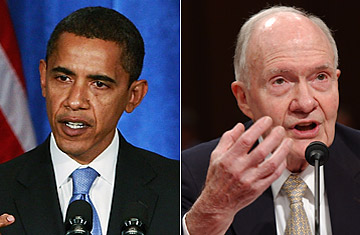
It's hard to pick up a paper these days without reading about Barack Obama courting the right. On Wednesday, his Inauguration committee announced that the non-partisan but socially conservative Evangelical Rick Warren would give the invocation Jan. 20 when Obama is sworn in as President. Bloomberg reports that moderate Republican Jim Leach of Iowa has been representing Obama at White House talks on the economy. And last Tuesday, the New York Times reported that Obama is being advised by foreign policy heavyweight Brent Scowcroft, National Security Adviser under the first President Bush and described by the Times as "an old Republican Realist."
Scowcroft is that, but he's not actually "advising" Obama. The President-elect has only spoken to him twice, briefly, in the last year and not on substance. Obama's other attempts at outreach, though apparently sincere, seem equally symbolic, at least for now. Obama has had short conversations with Reagan's Secretary of State George Shultz and former deputy Secretary of State Richard Armitage, and both men describe their conversations positively. But an Obama transition aide, when pressed about these contacts, admits that it is "not fair to put them in the category of advisers." Rick Warren and Obama are not particularly close: Obama has had only tangential contact with him over the years and disagrees with him on aspects of some social issues including abortion and gay rights.
So if Obama is not actually getting advice from these figures on his right, why's he calling them? And why are he and his aides waving them before the media like so many semaphore flags? (See TIME's Person of the Year, People Who Mattered, and more.)
It's not as if the President-elect needs to feign a willingness to listen to the right. He has already established his bipartisan bona fides on domestic and foreign policy by picking a Republican Defense Secretary, an undeclared but right-leaning National Security Adviser, an independent Treasury Secretary and now, reportedly, a Republican Transportation Secretary. In those positions centrists and Republicans won't be merely symbols of Obama's open-mindedness; they will be among his closest advisers.
Perhaps it's residual behavior from the campaign. Obama was something of a blank slate coming into the primary season one short year ago, and he used a loose network of "advisers" to draw politically convenient pictures of himself for voters. When he needed to look strong on Israel, for example, he brought in Dennis Ross, a former top negotiator who has sided with Israel in policy disputes over recent years. When he wanted to look conservative on money matters he tapped the guru of anti-inflation policy, Paul Volcker. (See pictures of Barack Obama's college years.)
One popular theory argues that the care and feeding of the right is a way to build cover for a progressive agenda. That may be true. Obama has enunciated some liberal foreign and domestic policy ideas, such as open-ended high-level talks with Iran, a rapid combat troop pull-out from Iraq and a possibly trillion dollar stimulus plan for the flagging economy: if he plans to roll them out soon, he might hope that one or two of his putative "advisers" will support him, or at least hold off on their attacks, because of his outreach.
But it's not at all clear that Obama has actually settled his positions on the more difficult foreign and domestic policy issues yet. Try drilling in with Obama's advisers on his approach to Arab-Israeli peace talks, negotiations with Iran or education reform, and you quickly find much debate but no hard policy decisions. In that light, Obama's outreach seems less about preventive cover for liberal policies than prudent network building for whatever positions, left or right, he ends up taking.
If that's the case, Obama's outreach to the right is working — so far. Pretty much everyone he speaks with, however briefly, comes away with the impression of a thoughtful and serious person who is more pragmatic than ideological, and whom they are willing to support in principle. "He sounded very impressive," says the usually non-demonstrative Shultz of his conversation with Obama. Says Armitage, "He's appropriately confident. He realizes the size of the bus that he's caught." And what do these right-of-center figures expect Obama is going ask of them eventually? "I don't know," says Armitage, "It's too early to tell."
See TIME's Person of the Year, People Who Mattered, and more.
